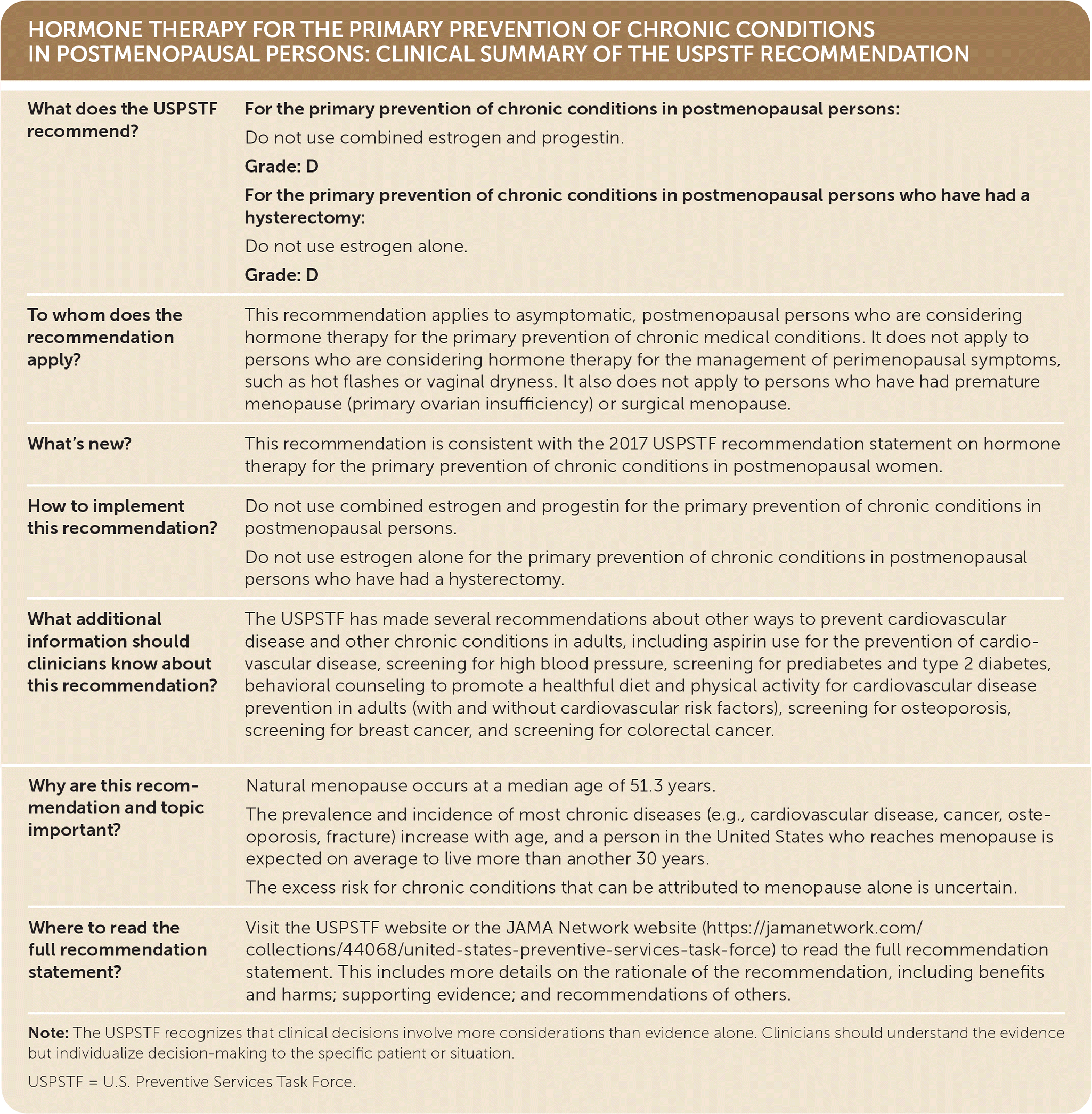
Am Fam Physician. 2023;107(6):online
Related Putting Prevention Into Practice: Hormone Therapy for the Primary Prevention of Chronic Conditions in Postmenopausal People
As published by the USPSTF.

| What does the USPSTF recommend? | For the primary prevention of chronic conditions in postmenopausal persons: Do not use combined estrogen and progestin. Grade: D For the primary prevention of chronic conditions in postmenopausal persons who have had a hysterectomy: Do not use estrogen alone. Grade: D |
| To whom does the recommendation apply? | This recommendation applies to asymptomatic, postmenopausal persons who are considering hormone therapy for the primary prevention of chronic medical conditions. It does not apply to persons who are considering hormone therapy for the management of perimenopausal symptoms, such as hot flashes or vaginal dryness. It also does not apply to persons who have had premature menopause (primary ovarian insufficiency) or surgical menopause. |
| What's new? | This recommendation is consistent with the 2017 USPSTF recommendation statement on hormone therapy for the primary prevention of chronic conditions in postmenopausal women. |
| How to implement this recommendation? | Do not use combined estrogen and progestin for the primary prevention of chronic conditions in postmenopausal persons. Do not use estrogen alone for the primary prevention of chronic conditions in postmenopausal persons who have had a hysterectomy. |
| What additional information should clinicians know about this recommendation? | The USPSTF has made several recommendations about other ways to prevent cardiovascular disease and other chronic conditions in adults, including aspirin use for the prevention of cardiovascular disease, screening for high blood pressure, screening for prediabetes and type 2 diabetes, behavioral counseling to promote a healthful diet and physical activity for cardiovascular disease prevention in adults (with and without cardiovascular risk factors), screening for osteoporosis, screening for breast cancer, and screening for colorectal cancer. |
| Why are this recommendation and topic important? | Natural menopause occurs at a median age of 51.3 years. The prevalence and incidence of most chronic diseases (e.g., cardiovascular disease, cancer, osteoporosis, fracture) increase with age, and a person in the United States who reaches menopause is expected on average to live more than another 30 years. The excess risk for chronic conditions that can be attributed to menopause alone is uncertain. |
| Where to read the full recommendation statement? | Visit the USPSTF website or the JAMA Network website (https://jamanetwork.com/collections/44068/united-states-preventive-services-task-force) to read the full recommendation statement. This includes more details on the rationale of the recommendation, including benefits and harms; supporting evidence; and recommendations of others. |
The full recommendation statement is available at https://www.uspreventiveservicestaskforce.org/uspstf/recommendation/menopausal-hormone-therapy-preventive-medication.
The USPSTF recommendations are independent of the U.S. government. They do not represent the views of the Agency for Healthcare Research and Quality, the U.S. Department of Health and Human Services, or the U.S. Public Health Service.
